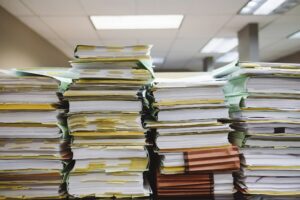I get some strange looks when I’m out during the day and I have my 3.5 year old, Lee, with me.
Where I live, the culture is very “into” the idea of organization and structure for kids and “freedom” for mom. Consequently, many parents, even sometimes stay at home moms, will send their 3 month old baby off to daycare from 7 am till 4 pm every single day for “socialization” and because “the structure that daycare provides is good for the kid”. Some refrain from sending off their kids that young, but by the time they’re 1.5 or two, nearly all kids in the area are in daycare at least half a day. The rare parent who keeps her 2 year old home will nearly all the time send her kid to preschool from age 3. So the fact that my 3.5 year old boy is home with me makes people look at me askance. They usually clarify and say “Oh, you’re keeping him home for another year and are sending him to preschool next year?”
I was walking to a friend’s house one day and yielded a tremendous score from next to one dumpster. A set of 13 math workbooks, covering all the math topics covered in first grade through sixth grade. Just headed for the dumpster. I brushed them off and made them part of our educational library. Why were they thrown out? Because they had the answers written inside them. In pencil.
An eraser fixes that all.
But even that isn’t necessary. These workbooks show what material needs to be taught, explains the material, and gives many problems for the student to solve. Even if answers were written in, the information is still there, and you can copy the questions onto another page for the child to solve if you’re worried about your child “cheating” with the answers already written there.
Many people have workbooks that they toss at the end of the year.
Ask all parents you know with children of varying ages if you can have any workbooks that they’d otherwise throw out. Most would be glad to pass these on to you. They’re a wealth of information, they’re free, and you just stopped them from entering a landfill. Beneficial for all!
Check out your local public schools. In the city in which I grew up, public school officials were required to make their resources available to the homeschoolers in their area. Textbooks and other educational resources could be borrowed for an entire school year to be used in homeschooling.
These policies will vary from state to state and school district to school district, but its worth calling up to check out if you can get what you need, free of charge, from the local public school.
If your children are older, you may want to dumpster dive at the end of semesters near local colleges. Many students buy books that they only use for one semester, and then no longer have a need for them. You can find so many things in those dumpsters, and many of the classes taught in college are also taught to high schoolers. (Low level college math, for example.) Try seeing if you can get any relevant textbooks from the dumpsters outside college dorms at the end of semesters.
Libraries, too, are a goldmine of information. Especially ones with free membership and interlibrary loans. During the year that my mother homeschooled me, we’d check out many educational books from the library. They even had textbooks on a variety of subjects available to borrow for as long as needed!
Before deciding to buy a book to teach your child, see if you can find what you need at your local library.
Many people buy schoolbooks that they only need for a short length of time. To recoup part of their cost, they often sell them on Ebay, Craigslist, etc. Yard sales, library sales, and second hand book stores are all options for finding educational resources. Before paying full price, see if you can find the books you need second hand.
Don’t forget the internet as a useful, frugal, educational tool. Nearly any subject you want to teach can be found online, often being taught in age appropriate ways. At the moment, I’m in love with Starfall.com for teaching pre and beginning reading skills, and even basic math. More advanced websites can be found for older kids and for other topics.
Educational videos, games, activities, lesson plans and even e-books can be found online. My favorite site for that is gamequarium.org.
Even full textbooks can be found online. Try searching google books before purchasing in a store. Many previews are available (which means 95% of a book, many times) of current books, and full version are available online of older books.
Before spending money on educational resources, scour the internet. Many times what you need is available right there at zero cost!
The most important thing to remember if you’re trying to keep down the cost of homeschooling is that you’ll need to build an educational stockpile, just as you built a food stockpile. When stockpiling food, you don’t only buy what you’ll use in the next few days; you buy what you’ll need in the future, if you’re able to get it now at a great price.
Quality homeschooling material is less easy to come by than cheap groceries, and you can’t always find what you need, when you need it. I strongly recommend keeping any textbooks or educational resources that you receive, even if you don’t need it at that point in time, if you know you’ll be teaching that material some point down the road; the difference in price between free textbooks and full priced textbooks is astronomical.
Even though my home is really small, I still kept all those math workbooks, even though I possibly won’t be using some of them for another 5 or 6 years. I don’t want to have to pay full price for any textbooks, ever.
—–
*If you’ve purchased educational books and workbooks and want to be able to use them for as long as possible, and for as many kids as possible:
1. Write answers on a separate paper. Make sure to list what problem you’re solving and the page number it’s from, but in most cases, it’s not necessary to write in the book.
2. Take a page protector and cut open one of the three closed sides. Slip the page protector onto the workbook/textbook page, and have your child write on the page protector with a dry erase marker. Before moving on to the next page, wipe the page protector clean, take it off one page, and move it on to the next. This is how we’ve managed to use my son’s 2 workbooks over and over and over and over again, and they’re still in terrific condition and we’ll be able to reuse them for Ike when the time comes.
No, homeschooling doesn’t need to cost a lot of money. Quality education is easily affordable, even if you’re teaching your children at home.
Do you homeschool or supplement your children’s education at home? What is your best frugal homeschooling resource? How much would you say you spend on educational material each year?
Do you/would you stockpile textbooks for future use, or do you only keep what you need at the moment?




